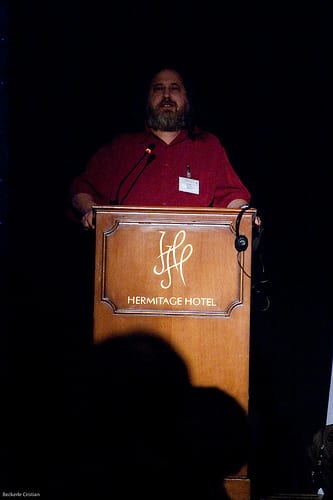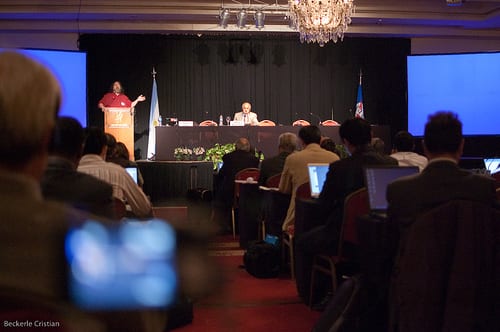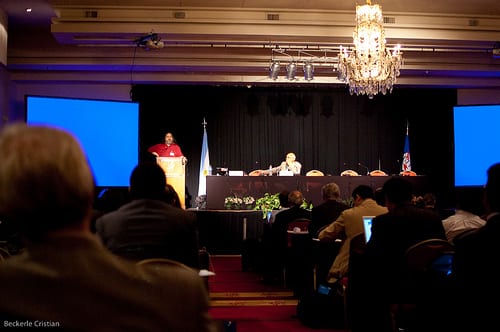Yesterday, and as I had mentioned previously, I was extremely lucky to attend the Richard M. Stallman talk in the city of Mar del Plata man.

Although he gave two talks, one for his part today and the talk yesterday that was contained within the ITU-T Kaleidoscope Conference: Innovations for Digital Inclusion organized by ITU (International Telecommunication Union).
Why see him in this talk and not in the other? Two reasons: the organizers of the other talk really took their time to decide the place and time (but here we are not going to discuss outside organizational issues) and because there was a very interesting ingredient in the ITU talk: Stallman was not in his sauce.

What do i mean by stallman was not in his sauce? That in this talk there were no user groups of GNU / Linux. There were no people who knew the difference between GNOME y KDE, and they probably weren't aware of the FSF, licenses, private packages or the sea by car. Nothing at all.
The title of the session in which it was presented RMS as a guest his name was Is digital inclusion a good thing? where the issues that in one way or another we always discuss in this space were discussed.
* Control of our information on the web, hand in hand with privacy and freedoms that we have as users;
* Software as a service, which in his opinion is a terrible question, since in addition to not being able to access the code, we don't even have the executable;
* Proprietary Software and how it restricts our obvious and natural freedoms regarding what we would do with our property (share it, copy it, change it to our liking, etc.);
* Free Software as an option over Proprietary Software ;
* Possibilities of implementation of Free Software versus Proprietary Software.
Reading the topic you will realize that we are always talking about the same thing, the topic of the talk is the one that you have previously exposed and that, if you remember, renaissance he had told us on another occasion.

My conclusions
From where I was located, you could perfectly see the notebooks of those attending the talk. If the good RMS had asked to turn around and show the notebooks, surely he would have been very bitter, since practically all had Windows, and some other, Mac OSX. The part of the talk dedicated to asking questions was very, very juicy, because the attendees asked the same questions that we all asked ourselves when we decided to start using free software:
* How do I know that there are no malicious code, backdoors or bugs in free software?
* Who controls free software?
* How do I apply for patents, licenses and more? We already know that a lot of freedom is counterproductive, there is no non-control on the part of someone.
* Why change the way I do the things I do for another that takes more time and is inefficient? This question was really amazing, the IBM gentleman who was consulting couldn't understand why RMS was doing something other than as suggested and that it was going to take longer, and RMS didn't understand what he meant by inefficient. They ended up closing the question with a very unbelievable "... OK ..." from the IBM lord.
* All this you say sounds very nice in theory, but it sounds a bit communist to me. I must tell you that, honestly, when that good man called him a communist in front of everyone else, my heart stopped. RMS smiled, straightened his hair and answered him in the best possible way that if we all know that communism has widely failed and that free software seeks to defend the individual freedoms of the software user, in no way could this be related with communism. Simple, acid and clear.
That was the last question (thank heaven who knows what they would have come up with after that), and after the corresponding applause of rigor, I was left with the impression that although everyone was applauding, no one was merely convinced of what he was saying RMS. Not one bit.
A battle (in my opinion) lost.
The change is in the generations to come. Let us aim to establish the teaching of free software in schools, from the most basic levels. I see no other way to change a thought as ingrained as the one that was evident in that talk.

I await your comments on the matter, for my part I will leave you telling you the immense joy of seeing in person Richard M Stallman and the deep pride that I felt when I realized that, although I am not a fanatic user of free software, I am not stuck in a box of thought so closed as not to realize that that man there was talking about something possible, and not of an inapplicable utopia. One step closer to being the true owner of my PC. Every day I am closer ...
What do you guys tell me, dear? Is digital even a good thing?
Regards!
PS: The models in the photograph are @marceloalegre and me, and the excellent images belong to Christian beckerle who allowed me to use them. A huge hug as well as a thank you of the same size.
I also went to see it, but in Capital where I am only talking about free software. It is a shit when someone who does not know Stallman or his speech and ideological line, criticizes him.
Stallman is a fat man, you see the chabon there, standing with tremendous humility, walking as if he were at home. For me he is a genius that very few understand.
Digital inclusion is necessary and the only solution is free software. There is no other viable option for educating children than free software. Any attempt to insert proprietary software is totally foolish.
Last week I was talking to some friends and I said to one: "I've been using a fedora for a few months," and another colleague from Uni who was with us told me: "And what windows is it?" The level of education regarding free software is still too much ... hopefully with time all this will change.
Greetings.
I believe that he has very little humility, arrogant and proud as he is alone. Because wearing a shirt and jeans does not mean that you are humble, humility comes the other way.
Kudos for the guy who asked about inefficiency.
Very good note Naty. The truth is that Stallman does not have to convince anyone of his philosophy: you have to educate and lead by example.
The question I always ask myself: why does the State spend millions and millions of dollars on proprietary software being able to have free, quality and well-documented free software. Negotiated gentlemen, that's why things don't change. As long as there are companies and money in between, it is very difficult.
Free Software is proprietary because it is not considered in the public domain and has a right holder who releases it under the conditions of the GPL license or another similar one, at this point it becomes free, for this reason proprietary software is said to be the opposite of free software. .
Esty, forgive me, but you're acting like a troll.
@Olovram: It doesn't seem like troll behavior to me, he just gave an opinion. Come on, the guy is not a god.
Very good note Naty
cite = »The change is in the generations to come. Let us aim to establish the teaching of free software in schools, from the most basic levels. » Completely agree: this week I had the enormous joy that one of my 12-year-old students installed a free OS on her home machine, if it were not for the small detail of having deleted the win $ (which led me to of a dual boot with win + Tuquito 3) I tell you, it is a lot of work to educate but the results are amazing, the kids are geniuses, another N @ ty coincidence: it is not an unrealizable utopia
*** Why change the way I do the things I do for another that takes more time and is inefficient? ***
Good question, and the same would apply for linux, right? Why leave an XP that works so well for a distro X or Y?
The answer is long and boring, but they already said it in part above, education, telling people where it comes from, why it originated, what it looks for, and a long etc ... those details are important.
If they do not know what you are talking about or how they understand you, in short I do not criticize RMS if he does not defend the cause of only SL who else is going to do it.
Good report xD greetings.
but if it is possessed (see personal photo) XDDDDDDDDDDDDDDDDDD
the truth bothers me (too much) to see those people who do not want to learn, do not want to know, but if you do not "teach" them they get angry.
few people are interested in knowing what SL is, not many people are open-minded, few people question things ...
what you want is to evolve the Software, what you need is a revolution, see, without the French Revolution it would have been very difficult to get to this ... and the other revolutions.
Evolution is everywhere, but the human being is capable of evolving not only physically, but intellectually, and like no other being, he is capable of choosing the way and his path.
RMS's "world" is not utopian, but it is not viable going in the same direction, it needs change, a revolution, a violent and profound change, as the RAE says.
By the way, does anyone know if any video of the talk on the 24th at the Chancellery is available?
I admire Mr. Stallman too much, Mr. GNU ...